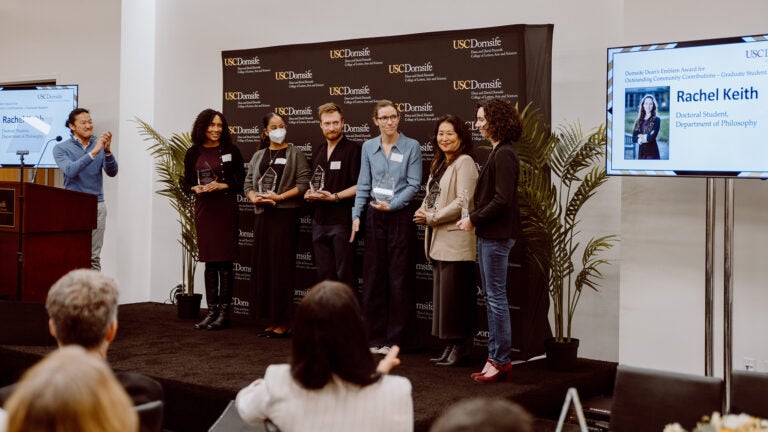
Inaugural Dornsife Dean’s Emblem Awards honor 6
The Office of Diversity, Equity, Inclusion, and Belonging at the USC Dornsife College of Letters, Arts and Sciences held the inaugural Dornsife Dean’s Emblem Awards on Jan. 31 at the Michelson Center for Convergent Bioscience, Room 101.
The awards recognize faculty, staff and students whose scholarly and service-focused contributions exemplify USC’s commitment to elevating and embodying the values of representative diversity, building inclusive communities and advocating for equity in higher education.
Following welcome remarks from Dean Amber D. Miller, Quade French, associate dean and chief diversity officer presented the awards.
“Countless of us have dedicated our careers to these causes over the years, and while faculty, staff, and students are rightfully celebrated in their departments and labs, we are excited for this new opportunity to celebrate contributions emblematic of the values we all share,” said French.
Emblem Award for Outstanding Scholarship
The Dornsife Dean’s Emblem Award for Outstanding Scholarship celebrates faculty and graduate students who use scholarship and research to spotlight broad social challenges of inequity or injustice, or to celebrate and honor often overlooked communities. Award recipients have produced scholarship that explores issues of access, representational diversity or the impacts of marginalizing discrimination, or have done exceptional work to inform more inclusive communities.
Faculty Awardee
Oneka LaBennett, associate professor of American studies and ethnicity and gender and sexuality studies, was recognized for her work to bridge the gap between academia and popular culture. Throughout her career, she has contributed perspectives, critiques and analyses of the intersection of race, culture and gender. Her 2011 book, She’s Mad Real: Popular Culture and West Indian Girls in Brooklyn (NYU Press), analyzes the impact of stereotyped, popular portrayals of Black girls and their crucial roles as consumers of culture in America. Her co-edited volume Racial Formation in the 21st Century (University of California Press, 2012) as well as her authored pieces in print media speak to anti-Black racism, anti-Asian discrimination and allyship.
LaBennett’s forthcoming piece titled Global Guyana: Shaping Race, Gender, and Environment in the Caribbean and Beyond (NYU Press, 2024), draws attention to an overlooked but important community, exploring intersections of race, gender and capitalism in Guyanese women’s lives.
LaBennett is also recognized as a consummate educator, as demonstrated through her highly popular course, “Women, Gender, and Sexuality in Hip Hop” (SWMS 499), her contributions to her department as graduate admissions chair, and her service on the University Committee of Academic Review.
Graduate Student Awardees

 Raquel Delerme, doctoral candidate in sociology, and Jackson Trager, doctoral candidate in psychology, were honored for their significant contributions to the “Everyday Respect” project. With project advisers Brittany Friedman, assistant professor of sociology, and Benjamin Graham, associate professor of international relations, their work on this groundbreaking project seeks to define “good communication” between police officers and community members. They aim to achieve this by analyzing police body camera footage, conducting focus groups and dialogues, and managing complex partnerships with the Los Angeles Police Department and the Metropolitan Police Department in Washington, D.C. This type of project, French noted, requires extra care and skillful communication to build trusting relationships with diverse groups.
Raquel Delerme, doctoral candidate in sociology, and Jackson Trager, doctoral candidate in psychology, were honored for their significant contributions to the “Everyday Respect” project. With project advisers Brittany Friedman, assistant professor of sociology, and Benjamin Graham, associate professor of international relations, their work on this groundbreaking project seeks to define “good communication” between police officers and community members. They aim to achieve this by analyzing police body camera footage, conducting focus groups and dialogues, and managing complex partnerships with the Los Angeles Police Department and the Metropolitan Police Department in Washington, D.C. This type of project, French noted, requires extra care and skillful communication to build trusting relationships with diverse groups.
Delerme and Trager’s work highlights the inextricable ties between culture, community and scholarship, and their contributions are helping to build a more equitable and safe society, as well as advance diversity, equity and inclusion.
Emblem Award for Outstanding Community Contributions
The Dornsife Dean’s Emblem Award for Outstanding Community Contributions celebrates staff, faculty and graduate students who engage in work to strengthen the community from within. These awardees are committed to building relationships, programs and partnerships with others to create a more connected and stronger USC Dornsife community. Beyond that, these recipients were also selected for their consistent respect, support and kindness for others.
Faculty Awardee
 Carly Kenkel, Wilford and Daris Zinsmeyer Early Career Chair in Marine Studies and assistant professor of biological sciences, was recognized for her efforts to expand DEIB initiatives and build a broader, more inclusive community both inside and outside of her department. Kenkel recognized the need for an organized, departmental endeavor to advance DEIB initiatives, leading her to co-found a department-level DEIB committee. She also co-founded a USC Dornsife natural and life sciences division diversity, equity and inclusion committee that unites efforts across departments.
Carly Kenkel, Wilford and Daris Zinsmeyer Early Career Chair in Marine Studies and assistant professor of biological sciences, was recognized for her efforts to expand DEIB initiatives and build a broader, more inclusive community both inside and outside of her department. Kenkel recognized the need for an organized, departmental endeavor to advance DEIB initiatives, leading her to co-found a department-level DEIB committee. She also co-founded a USC Dornsife natural and life sciences division diversity, equity and inclusion committee that unites efforts across departments.
While working on her research in marine studies, Kenkel has participated in several programs designed to raise her positive influence on those around her, including bystander intervention trainings, Trojans for Excellence, and the USC Academic Senate Faculty Environment and Employment Committee. Students and her colleagues recognize her lab not only for its scholarship, but for being a place of support, community and connection.
Staff Awardee
 Grace Ryu, associate director of the East Asian Studies Center, has developed or enhanced numerous programs in support of students, faculty and staff. Highlights include her development of the “Race/Solidarity: Transpacific Conversations” series, which addressed issues of difference, conflict and allyship across ethnic communities, and her role in the creation of the Korean Studies Institute. Notably, Ryu co-founded USC’s Asian Pacific Islander Staff and Faculty Association (APIFSA), which has grown into one of the largest staff and faculty organizations on campus with more than 400 members. The group advocates for equity and inclusion of the Asian American and Pacific Islander community at USC. Under Ryu’s leadership, APIFSA has developed a robust programmatic arm sponsoring discussions, panels and workshops with renowned speakers.
Grace Ryu, associate director of the East Asian Studies Center, has developed or enhanced numerous programs in support of students, faculty and staff. Highlights include her development of the “Race/Solidarity: Transpacific Conversations” series, which addressed issues of difference, conflict and allyship across ethnic communities, and her role in the creation of the Korean Studies Institute. Notably, Ryu co-founded USC’s Asian Pacific Islander Staff and Faculty Association (APIFSA), which has grown into one of the largest staff and faculty organizations on campus with more than 400 members. The group advocates for equity and inclusion of the Asian American and Pacific Islander community at USC. Under Ryu’s leadership, APIFSA has developed a robust programmatic arm sponsoring discussions, panels and workshops with renowned speakers.
Ryu is also highly regarded by her peers for her generosity and commitment to her community. Those nominating her for the award noted how she has personally supported each of them and cited her exemplary professionalism and expertise.
Graduate Student Awardee
 Rachel Keith, doctoral candidate in philosophy, was recognized for her significant strides in building a stronger and more inclusive academic department. Keith engages with faculty to critically examine department policies and practices from a perspective of equity and transparency.
Rachel Keith, doctoral candidate in philosophy, was recognized for her significant strides in building a stronger and more inclusive academic department. Keith engages with faculty to critically examine department policies and practices from a perspective of equity and transparency.
Notably, she developed a mentoring program aimed at enhancing accessibility to the philosophy program and its resources for underrepresented minority undergraduate students. This innovative program facilitates connections between undergraduate students and graduate mentors, providing valuable guidance and support, reducing barriers to entry and building more inclusive academic practices.
Keith extends her influence beyond USC Dornsife as co-director of the university’s chapter of Minorities and Philosophy, an international organization committed to breaking down barriers for underrepresented groups in the field. This dedication to mentoring and increasing accessibility has garnered significant recognition, including grant funding from the American Philosophical Association.
